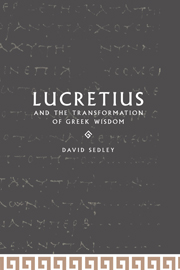Book contents
- Frontmatter
- Contents
- Preface
- Introduction
- Chapter 1 The Empedoclean opening
- Chapter 2 Two languages, two worlds
- Chapter 3 Lucretius the fundamentalist
- Chapter 4 Epicurus, On nature
- Chapter 5 Lucretius' plan and its execution
- Chapter 6 The imprint of Theophrastus
- Chapter 7 The transformation of book I
- Epilogue
- Bibliography
- Index locorum
- General index
- Index of modern scholars
Preface
Published online by Cambridge University Press: 22 September 2009
- Frontmatter
- Contents
- Preface
- Introduction
- Chapter 1 The Empedoclean opening
- Chapter 2 Two languages, two worlds
- Chapter 3 Lucretius the fundamentalist
- Chapter 4 Epicurus, On nature
- Chapter 5 Lucretius' plan and its execution
- Chapter 6 The imprint of Theophrastus
- Chapter 7 The transformation of book I
- Epilogue
- Bibliography
- Index locorum
- General index
- Index of modern scholars
Summary
This book is the partial repayment of a debt. It was my desire to understand Lucretius better that led me into postgraduate research on Epicureanism. And, even more than the philosophy component of my Greats course at Oxford, it was that postgraduate research on Epicureanism that emboldened me to pursue the study of ancient philosophy as a career. It would therefore be only a small exaggeration to say that I learnt ancient philosophy in order to understand Lucretius. Until recently I have ventured little about Lucretius in print, but I have been thinking about him throughout my teaching career at Cambridge. This book is the outcome, and my way of thanking its eponymous hero.
My fascination with Lucretius was fuelled when as an Oxford undergraduate I had the good fortune, in 1966–7, to attend the wonderful lectures on Lucretius by the then Corpus Professor of Latin, Sir Roger Mynors. Mynors told us that he had himself in his early days been enthralled by Cyril Bailey's Lucretius lectures, none of whose brilliance, he remarked, showed through into Bailey's later monumental edition of the poet (‘He had gone o the boil’). I like to think that some excitement from the real Bailey ltered through to me in those lectures.
Another debt is to David Furley, whose book Two Studies in the Greek Atomists I came across in Blackwell's while studying Aristotle for Greats.
- Type
- Chapter
- Information
- Lucretius and the Transformation of Greek Wisdom , pp. xi - xivPublisher: Cambridge University PressPrint publication year: 1998



